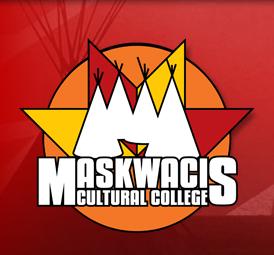Maskwacis Cultural College facts for kids
 |
|
|
Former names
|
Maskwacis Cultural Centre |
|---|---|
| Motto | Start your journey |
| Type | Two-year tribal college |
| President | Dr. Claudine Louis |
| Location |
P.O. Box 960 Maskwacis T0C 1N0
,
52°49′16″N 113°27′16″W / 52.8210°N 113.4544°W |
| Campus | urban/suburban reserve |
| Website | http://www.mccedu.ca |
Maskwacis Cultural College (MCC) is a special school in Maskwacis, Alberta, Canada. It's a place where students can continue their education after high school. MCC offers many different programs. These include learning to read and write better, getting two-year college diplomas, and even starting university courses.
Contents
About Maskwacis Cultural College
Maskwacis Cultural College is a private school. This means it is not run by the government. It is located within the lands of the Four Nations of Maskwacis. These are the Samson, Ermineskin, Louis Bull, and Montana First Nations.
Working Together for Education
Maskwacis Cultural College is part of a group called the First Nation and Adult Higher Education Consortium. This group helps its members work together. Their goal is to provide great education for adults and older students. This education is fully guided by First Nations people.
A Look at MCC's History
The story of Maskwacis Cultural College began a long time ago. In 1974, the Four Bands of Hobbema (now Maskwacis) created the Maskwacis Cultural Centre. This center was made to help keep the Plains Cree culture and history alive. It also helped develop the Cree language.
Becoming a College
From 1974 to 1986, the center helped students take courses from other schools. Then, in 1986, leaders wanted the center to become a real college. The Chiefs of the Samson, Ermineskin, Louis Bull, and Montana Bands supported this idea.
In July 1988, a special law was passed. This law officially made the Maskwacis Cultural College a private school. It gave the college the power to give out certificates and diplomas to students.
University Connections
By 1987, the university courses at Maskwacis Cultural College were recognized. This meant students could transfer their credits to big universities. These included the University of Alberta, the University of Calgary, and the University of Lethbridge. This made it easier for students to continue their studies.
What Can You Study at MCC?
Students at MCC can complete the first two years of many university degrees. This means they can start their university journey close to home. The college also offers many other programs. These include courses to improve skills, get certificates, and earn diplomas.
Academic Programs Offered
MCC has many different programs for students. Here are some of the subjects you can study:
- Adult Basic Education (ABE): Helps adults improve their reading, writing, and math skills.
- Bachelor of Education: For students who want to become teachers.
- Bachelor of Arts: A wide range of subjects in arts and humanities.
- Academic Upgrading: Helps students get ready for college or university.
- Cree Language Instructor Training Diploma: Teaches people how to teach the Cree language.
- Diploma leading to Bachelor of Education: A two-year program that can lead to a teaching degree.
- Diploma leading to Bachelor of Arts: A two-year program that can lead to an arts degree.
- First Nations Management Diploma: Teaches skills for managing organizations in First Nations communities.
- Indigenous Social Work Diploma: Helps students learn to support people and communities.
- Educational Assistant (Special Needs): Trains people to help students with special needs in schools.
- Maskwacis Administrative Assistant: Teaches office and administrative skills.
- Prior Learning Assessment & Recognition (PLAR) Program: Helps students get credit for what they already know.
- University & College Preparation (UCEPP): Gets students ready for higher education.
Help with College Costs
The Government of Canada offers a special tool to find money for Indigenous students. This tool lists over 680 scholarships, bursaries, and other ways to help pay for college. These are offered by governments, universities, and businesses. They help Indigenous students go to college or university.
See also
 | Selma Burke |
 | Pauline Powell Burns |
 | Frederick J. Brown |
 | Robert Blackburn |

